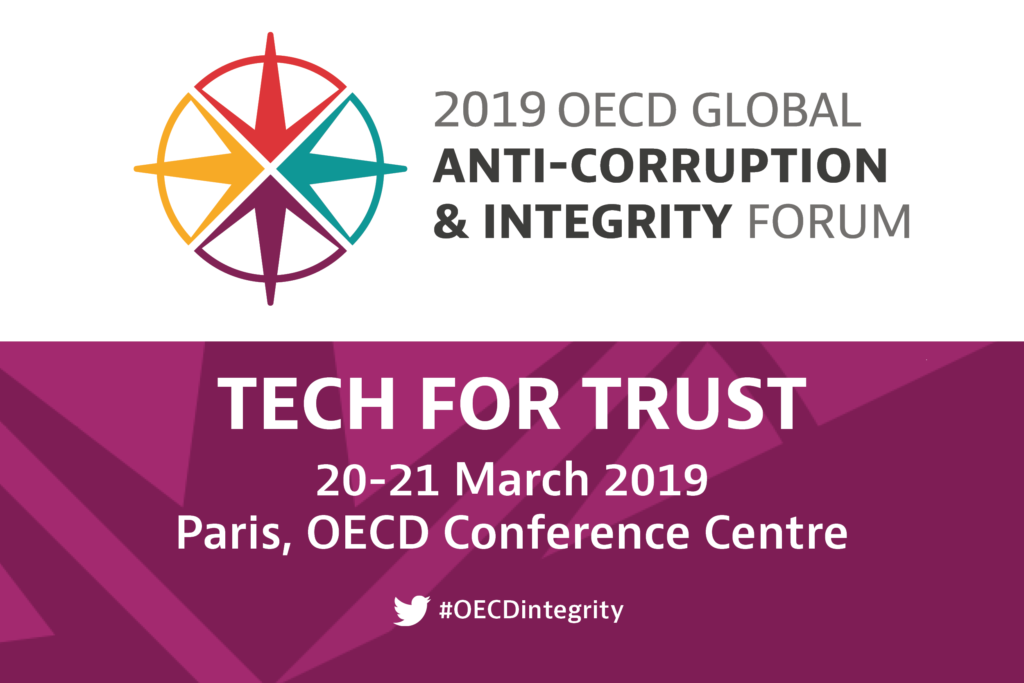Don’t Let High Tech Have the Last Say in Risky Emerging Markets
Photo Credit: OECD
By Louisa Tomar, Program Officer with CIPE’s Global Team
It goes without saying that cutting-edge technologies are transforming the way multi-national companies and government agencies provide goods and services. At the same time, much of the developing world continues to rely on relatively low-tech solutions to tackle complex problems like poor service delivery, weak governance, trade barriers, and corruption. This disparity is what brings the Center for International Private Enterprise (CIPE) to this year’s Organisation for Economic Cooperation and Development (OECD) Anti-Corruption and Integrity Forum. CIPE will be leveraging the experiences of partners from two emerging markets to discuss how local business communities are using technology to fight corruption and how they can benefit from global tech innovation.
Local businesses, including small and medium-sized enterprises (SMEs) and family-run firms, are vital elements of global supply chains. From a corruption point of view, SMEs also represent an outsized part of the corruption risk in global value chain. Especially in emerging markets, these smaller businesses are a significant part of the supply side of corruption. In addition to their susceptibility to giving bribes, SMEs face resource constraints which limit their access and adoption of cutting-edge technologies generally and result in little discretion when it comes to investing in compliance measures. Nonetheless, CIPE is working with business communities in high-risk markets that are opting to adopt strict compliance standards and are resisting corruption and capture.
As the anti-corruption community starts using new AI technologies, it should be mindful not to limit these tools to only fit low-risk markets. Local reformers may be signaling – though not necessarily through their company’s data footprint – that they are dedicated to integrity and compliance. For example, information asymmetries in due diligence often create barriers for small and mid-sized firms to expand their operations and supply chain partnerships.
To the extent that automated, anti-corruption compliance systems are programmed towards less tolerance of risk, bias against high-risk markets may improve compliance in multi-nationals. But, at the same time, multi-nationals’ automated risk aversion removes potential incentives such as investment and upskilling for local businesses in emerging markets to improve their integrity. In other words, if such local businesses have little hope of joining global supply chains or attaining global sustainable development goals, then why would those businesses put in place anti-corruption compliance programs? As new innovations are applied to strengthening anti-corruption compliance and risk management, understanding which low-tech solutions are achieving the same objectives is a first step towards business and system interoperability.
CIPE’s panel at the OECD’s Integrity Forum, Helping Local Business Benefit from Tech Innovation, is an opportunity to learn how local business is addressing weak governance and corruption risks and to discuss how these efforts can be better connected and supported by leading firms and technologists. The panel features Pana Ratanabanangkoon from Thailand’s Collective Action against Corruption Coalition (CAC) and Majdi Hassen of the Tunisian think tank Institut arabe des chefs d’entreprises (IACE). The panel will address how local business communities are fighting corruption through existing technological capabilities – in Thailand CAC applied technology to increase and incentivize business integrity, and in Tunisia IACE implemented a National Business Agenda which reduced bureaucratic hurdles that lead to bribery for entrepreneurs starting and growing businesses.
One goal of the session is to help attendees to the world’s largest annual anti-corruption conference to think about how to assess and integrate local systems into the new platforms, tools, algorithms being developed at the cutting-edge. CIPE encourages representatives of multi-national companies and non-governmental organizations with global supply chains to share how they use technology to connect with local partners, conduct due diligence, and support integrity initiatives in frontier markets. Through the discussion CIPE seeks to hear from participants as to how local businesses can best deploy technology strategies to expand growth opportunities by demonstrating their commitment to integrity and compliance.
This panel will be moderated by Louisa Tomar, Global Program Officer at CIPE. Louisa works on programs related to anti-corruption compliance and the intersection of technology and democracy. CIPE’s Anti-Corruption and Governance Center Director, Frank Brown, will also be present at the session to help facilitate dialogue and is available throughout the Forum to discuss CIPE and its partners’ anti-corruption efforts. We encourage you to tweet any questions for Louisa, Frank or our panelists to @CIPE_ACGC. For the latest anti-corruption news out of CIPE visit acgc.cipe.org
Join the CIPE session ‘How local business can harness the benefits of tech innovation’ on 21 March. View agenda details at oe.cd/2tn
For more information about Thailand’s Collective Action Coalition Against Corruption (CAC), visit: https://www.collective-action.com/content/private-sector-collective-action-coalition-against-corruption-cac
For more information about Tunisia’s National Business Agenda initiative SOS IJRAAT system visit: https://www.cipe.org/newsroom/cipe-iace-launch-hotline-help-tunisian-businesses-facing-bureaucratic-hurdles/

